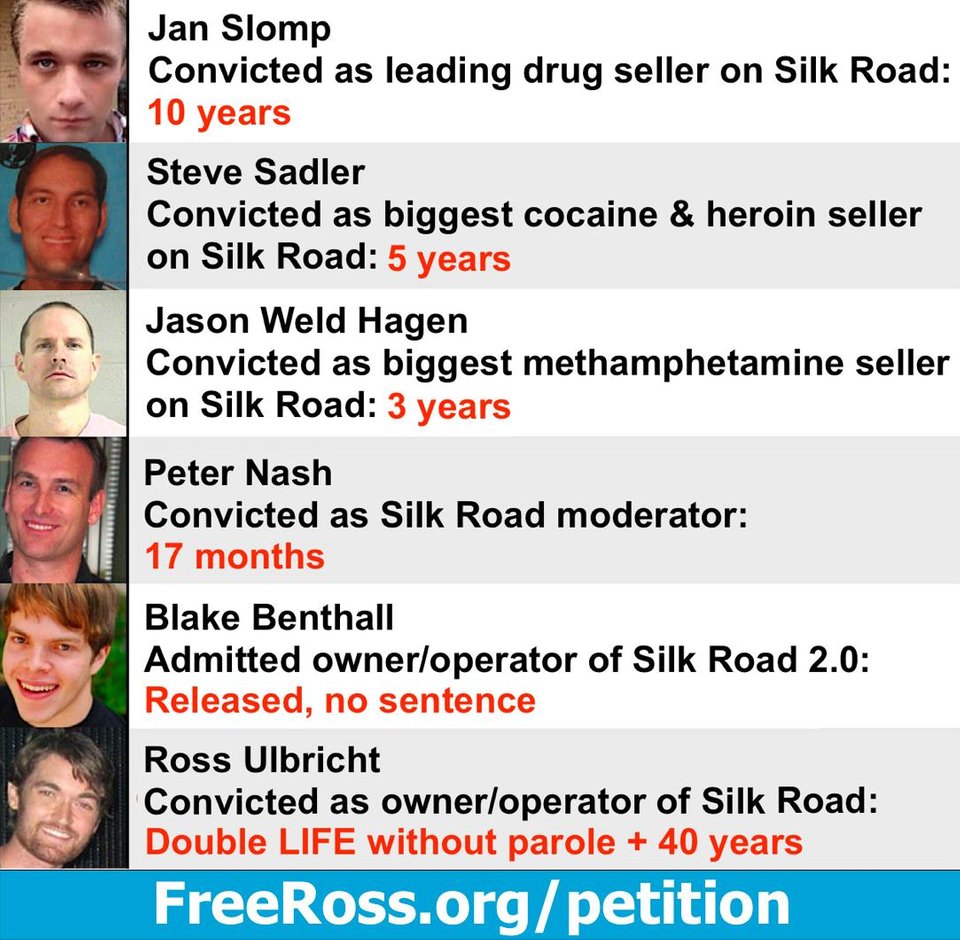Ross Ulbricht, martyr

Quick Take
- Ross Ulbricht may get more jail time then Mexican drug lord El Chapo
- That’s not right

A popular meme circulating this week compares the life sentence prosecutors are expected to seek for gangster El Chapo - a convicted drug trafficker with ties to crimes up to and including murder - and the sentence of Ross Ulbricht, founder of the original Silk Road, who received double life without parole, plus 40 years. Like Ponzi and Madoff before him, Ulbricht's name to many is now synonymous with bad dealings and even worse consequences. But, unlike Ponzi and Madoff, he should walk free. He is the definitive martyr of the crypto age.
Let me explain.
A man like Ulbricht found a hole. Like Andrew Auernheimer aka Weev - a hacker who went to jail for figuring out that AT&T screwed up their iPad customer software and leaked the entire list of customers to Gawker - Ulbricht stumbled upon a way to circumvent easily circumventable systems. He found a hole in the fence and instead of warning the farmer immediately he had a look around. That was his only crime.

Before we continue, let's address Weev. Weev is a very special case. His time in prison radicalized him to a degree that makes him abhorrent today and his work - essentially a sort of neo-Nazi performance art that takes his original "trolling" to a new and extreme level - has made him an alt-right darling. I can't condone him in his current form and he was pretty hard to take before he went to jail. But when the federal government charged him in January 2011 under the Computer Fraud and Abuse Act, they set a deadly precedent. The sentence ignored AT&T's vast incompetence and instead blamed and destroyed a hacker - a hole finder.
Ulbricht found a similar hole. I've long said that cryptocurrencies weaponize the traditional nerd. Whereas before you showed your programming prowess by writing a device driver for Linux, now you show your programming prowess by building on the blockchain. And, whereas before your prowess resulted in a nice pat on the back from the open source community, cryptocurrency has allowed that same nerd to amass a small fortune.
The government considers Ulbricht a drug dealer. Ignoring the ridiculous crimes committed by his arresting agents, what Ulbricht did was little more than create a database. If we're going to compare his work out into a real world tool, the closest analog would be a dark pool on Wall Street - a black box trading system that, in this particular case, was far darker than anyone could imagine.
It's impossible to defend a drug dealer. It's impossible to defend a murderer. It's impossible to defend a neo-Nazi. But, at its core, the thing Ross Ulbricht, private citizen, is guilty of is the creation of a system that circumvented a damaged institution. AT&T exposed customer records, not Weev. And Ulbricht created a nearly fool-proof drugs market, a perfect capitalistic system that, like all perfect capitalistic systems, eventually collapsed due to infighting and greed.
He didn't murder anyone (per se) and prosecutors are hard at work trying to drop the murder-for-hire rap. He shipped some mushrooms once and then took a cut of thousands of potentially illicit transactions. But he's not El Chapo, a man who has claimed to have killed 3,000 people and escaped from prison in ways so comical that he's like cocaine-toting Wile E. Coyote.
Ultimately it's about saving face. In Weev's case the telecoms were suddenly thrust into a situation where personal data consisted of more than just a phone number and whether or not you had call waiting. In Ulbricht's case the FBI discovered a juicy threat and got gloriously lucky when Ulbricht - a kid who wouldn't be out of place in the programmers bullpen at a Valley startup - introduced a bug into his system. Like most computer crimes cases, the fall guy is usually someone who flew too close to a newborn sun. Like hackers Robert Morris and Kevin Mitnick before him, Ulbricht was made an example. His sentence is a wagging finger at some kid in a STEM classroom who suddenly realizes that the Internet is a machine designed to route around damage. And his sentence is ridiculous. Dark markets are now ubiquitous and you can bet that they won't be run as poorly as El Chapo's, a network compromised by a surly IT guy.

Instead we have to remember that El Chapo is scum, a smug drug lord who knows he'll be fine after he's released. Ulbricht was the guy pointing out the holes, telling us that something was changing. These Cassandras are rarely sympathetic characters and time and history have shown us that they are often deeply flawed. There is hope. Former hackers like Mitnick survived incarceration and were sprung free amidst problems that they had originally predicted - and exploited - before their arrest. But a hacker can't receive a greater sentence than an actual murderer. If they do, their warnings will retreat even further underground and we won't know what hit us until it is far too late.
© 2023 The Block. All Rights Reserved. This article is provided for informational purposes only. It is not offered or intended to be used as legal, tax, investment, financial, or other advice.


